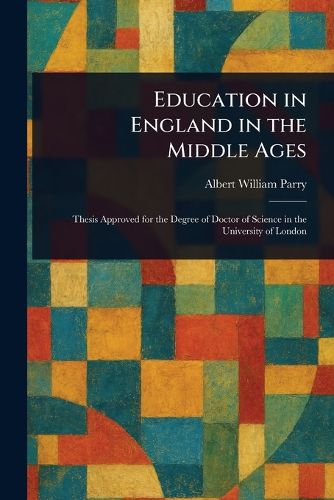Readings Newsletter
Become a Readings Member to make your shopping experience even easier.
Sign in or sign up for free!
You’re not far away from qualifying for FREE standard shipping within Australia
You’ve qualified for FREE standard shipping within Australia
The cart is loading…






This title is printed to order. This book may have been self-published. If so, we cannot guarantee the quality of the content. In the main most books will have gone through the editing process however some may not. We therefore suggest that you be aware of this before ordering this book. If in doubt check either the author or publisher’s details as we are unable to accept any returns unless they are faulty. Please contact us if you have any questions.
Explore the fascinating origins of English education with Albert William Parry's "Education in England in the Middle Ages." This meticulously researched historical thesis, originally approved for the Degree of Doctor of Science at the University of London, delves into the scholastic landscape of medieval England.
Journey back to a time of burgeoning universities and evolving educational philosophies. Parry's work offers a comprehensive overview of the development of education during the Middle Ages, examining the key institutions, influential figures, and enduring principles that shaped the intellectual landscape of England. Discover the roots of scholasticism and the foundations upon which modern English education was built.
A valuable resource for anyone interested in the history of education, medieval studies, or the social sciences. This book provides a detailed and insightful look into the intellectual life of England during a pivotal period of its history.
This work has been selected by scholars as being culturally important, and is part of the knowledge base of civilization as we know it.
This work is in the public domain in the United States of America, and possibly other nations. Within the United States, you may freely copy and distribute this work, as no entity (individual or corporate) has a copyright on the body of the work.
Scholars believe, and we concur, that this work is important enough to be preserved, reproduced, and made generally available to the public. We appreciate your support of the preservation process, and thank you for being an important part of keeping this knowledge alive and relevant.
$9.00 standard shipping within Australia
FREE standard shipping within Australia for orders over $100.00
Express & International shipping calculated at checkout
This title is printed to order. This book may have been self-published. If so, we cannot guarantee the quality of the content. In the main most books will have gone through the editing process however some may not. We therefore suggest that you be aware of this before ordering this book. If in doubt check either the author or publisher’s details as we are unable to accept any returns unless they are faulty. Please contact us if you have any questions.
Explore the fascinating origins of English education with Albert William Parry's "Education in England in the Middle Ages." This meticulously researched historical thesis, originally approved for the Degree of Doctor of Science at the University of London, delves into the scholastic landscape of medieval England.
Journey back to a time of burgeoning universities and evolving educational philosophies. Parry's work offers a comprehensive overview of the development of education during the Middle Ages, examining the key institutions, influential figures, and enduring principles that shaped the intellectual landscape of England. Discover the roots of scholasticism and the foundations upon which modern English education was built.
A valuable resource for anyone interested in the history of education, medieval studies, or the social sciences. This book provides a detailed and insightful look into the intellectual life of England during a pivotal period of its history.
This work has been selected by scholars as being culturally important, and is part of the knowledge base of civilization as we know it.
This work is in the public domain in the United States of America, and possibly other nations. Within the United States, you may freely copy and distribute this work, as no entity (individual or corporate) has a copyright on the body of the work.
Scholars believe, and we concur, that this work is important enough to be preserved, reproduced, and made generally available to the public. We appreciate your support of the preservation process, and thank you for being an important part of keeping this knowledge alive and relevant.